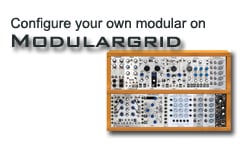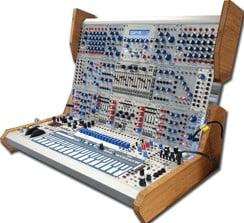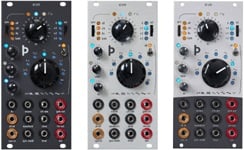Doepfer A-160-2V Clock Divider II (black vintage version)
OverviewDoepfer A-160-2V Clock Divider II
Module A-160-2V is an enhanced version of the standard clock divider A-160. The module is a frequency divider for clock/trigger/gate signals, designed to be a source of lower frequencies, particularly for rhythm uses. The Clock input will take any digital signal from, eg., an LFO, MIDI sync, or the gate from a MIDI-CV interface. At the outputs, you have access to three sets of seven different sub-divided clock signals, from half the clock frequency down to 1/128. The low/high levels of the output signals are 0V and about +10V.
The A-160-2 also has a reset input. Whenever a reset signal is sensed, all outputs are set to certain levels which depend upon the selected mode.
These are the most important features of the module:
Three different sets of dividing factors, selected by a three-position switch at the front panel:
power of two: 2, 4, 8, 16, 32, 64, 128
prime numbers: 2, 3, 5, 7, 11, 13, 17
integer: 2, 3, 4, 5, 6, 7, 8
Two output modes, selected by a two-position switch at the front panel:
Gate mode: outputs act like the outputs of typical binary dividers
Trigger mode: in this mode the outputs are AND-wired with the clock signal (i.e. the clock pulsewidth affects the pulsewidth of the outputs)
Clock edge type selected by a jumper on the pc board:
positive: the rising edge of the clock signal triggers the state change of the outputs
negative: the falling edge of the clock signal triggers the state change of the outputs
Reset behaviour by two jumpers on the pc board:
level triggered: the level at the Reset input triggers the Reset
edge triggered: the edge of the signal at the Reset input triggers the Reset
positive: a high level (> 2.5V) or the rising edge at the Reset input triggers the Reset
negative: a low level (< 1 V) or the falling edge at the Reset input triggers the Reset
Output polarity selected by a jumper on the pc board:
positive: non-inverted outputs
negative: all seven outputs are inverted
The sketches show the behaviour of the outputs for the different modes:
Note: It will be not possible to connect the A-161 to the A-160-2 as the conception of the A-160-2 is totally different compared to the A-160 with it's fixed binary dividing.
Width: 4 TE / 4 HP / 20.0 mm
Depth: ? mm measured from the rear side of the front panel)
Current: ? mA



